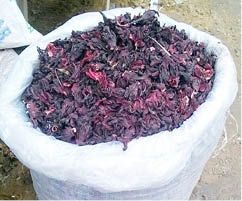NAQS signs phytosanitary protocol with Mexico to attract $3bn annually
The Comptroller General of the Nigeria Agricultural Quarantine Service (NAQS) Dr Vincent Isegbe said the agency and its Mexican counterpart body, SENASICA, signed a phytosanitary protocol to stabilize and grow the export of Nigerian hibiscus flowers (zobo) to Mexico. The framework is designed to future-proof bilateral trade in hibiscus between Nigeria and the largest importer […]

The Comptroller General of the Nigeria Agricultural Quarantine Service (NAQS) Dr Vincent Isegbe said the agency and its Mexican counterpart body, SENASICA, signed a phytosanitary protocol to stabilize and grow the export of Nigerian hibiscus flowers (zobo) to Mexico.
The framework is designed to future-proof bilateral trade in hibiscus between Nigeria and the largest importer of Nigerian hibiscus against avoidable disruptions.
With the signing of the hibiscus work plan, Nigeria will earn $3 billion annually from exporting hibiscus to Mexico.
Speaking at the 4th comptroller general’s submit and management retreat in Abuja, Dr Isegbe said that Hibiscus is a metaphor for the countless high-value exportable agro-commodities we underutilize and take for granted.
- Nigeria’s civil aviation workers least paid in Africa – NCAA DG
- 2023: Onaiyekan, Khalid differ on state of nation, others
He said the agency was working with stakeholders to mainstream good agricultural practices and compliance with sanitary and phytosanitary standards in their production, processing, and value-addition activities.
“Our work is essential any day, any time—it is all the more so considering the dire need for the country to escalate national revenue earning, create jobs for the teeming unemployed and underemployed youths and lift millions of our citizens out of poverty.
“Agro-export intensification will help us to boost our overall agricultural productivity, generate sustainable wealth, and improve household incomes among the large swath of the 70 per cent of our population that are engaged in agriculture and agro-allied industries,” Dr Isegbe stated.
The Comptroller General said that the agency’s Export Improvement Initiative and Export Certification Value Chains seeks to democratize the involvement of micro, small and medium-scale players in agro-export activities, adding that “the diligence of the Nigerian is most evident in the agricultural sector. Our people toil, in the rain and in the sun, to cultivate crops and rear animals. However, the majority of them reside in rural areas. They eke out their subsistence in the low returns of the local market.”
“Many of them are unaware of their right to access the ECOWAS and African Continental Free Trade Area markets. Moreover, they know little or nothing about export standards. They don’t consider themselves qualified to export because they presume that only the rich and the affluent can export. We are working to overcome this challenge of “the last mile” by targeting grassroots farmers, offtakers and processors. In the past four years, NAQS has organized scores of trainings on export opportunities and export procedures for stakeholders on various commodities across many states, as part of our commitment to demystifying agricultural export in Nigeria,” he said.
The Agency is entrusted with the critical mandate to inspect and certify food and agricultural products for export and to facilitate international trade.
